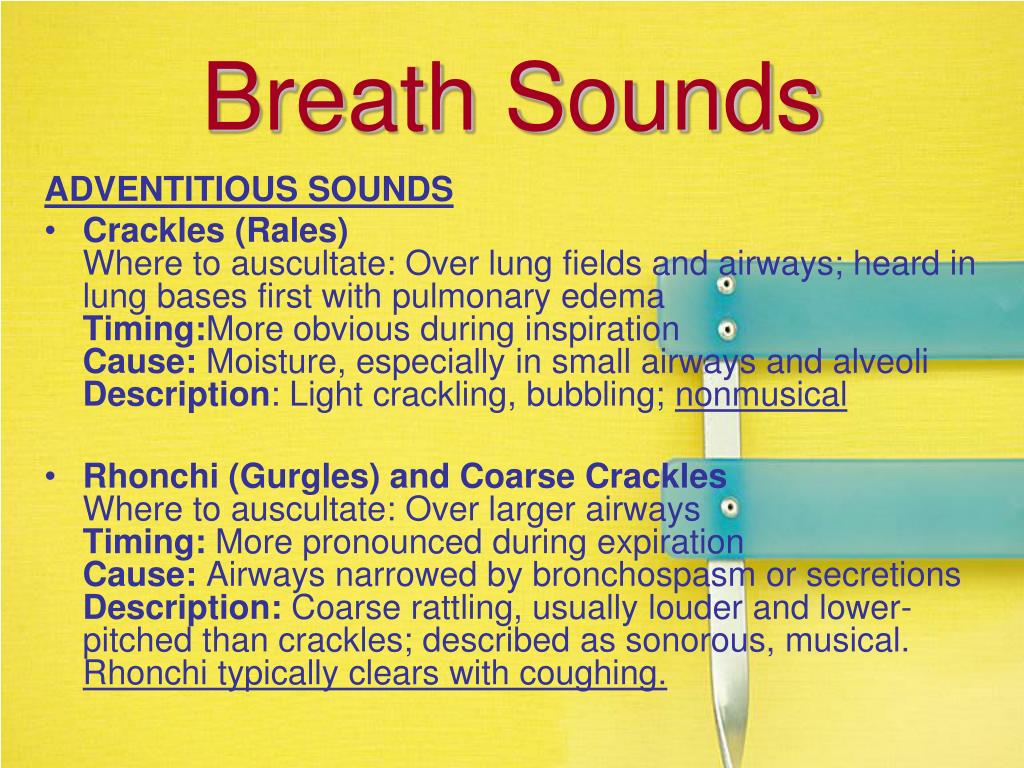
Stridor is more common in children both because their airways are narrower and because they are more likely to put random objects in their mouths. Blockages not caused by a foreign object can also arise, such as from swelling or a muscle spasm. In these cases, the partially obstructed trachea will produce stridor sounds. You may be surprised to learn that itâs possible to have an object lodged in your throat without causing you to choke. Emphysema is normally the result of prolonged inhalation of smoke, pollution, or certain industrial fumes. As a form of COPD, emphysema results in wheezing sounds as well as decreased breathing sounds when exhaling. This impairs the ability of your lungs to process oxygen (due to reduced surface area) and limits how much can get into the bloodstream. Emphysema also affects the elastic fibers that support the airways, making it harder to exhale.

Emphysema is what happens when these sacs weaken and burst, creating what amounts to holes in the lungs. The air sacs of the lung are spherical under normal conditions. Moist rales can be heard when someone with edema tries to take a deep breath. Heart failure results in the gradual buildup of fluid in the lungs, a condition known as pulmonary edema.

Heart FailureĬongestive heart failure can arise when the heart is damaged by physical injury, a prior heart attack, an infection, medication side effects, or genetic conditions, among other causes. Children and infants between three months and five years of age are more likely to get croup, but it can occur at any age. Due to the narrowing of the airway, croup produces wheezing-type lung crackles. CroupĬroup is the term used to describe the swelling of the vocal cords, normally caused by a viral infection, and is identifiable by a cough that sounds something like a seal barking. Basically, what happens during post-nasal drip is that excess mucus from your nose makes its way down your throat and into the airway, where it can produce lung crackles that you can sometimes hear without a stethoscope. This is a possible cause if you hear crackling lungs when lying down but not when you sit up. Incidentally, asthma falls under the category of chronic obstructive pulmonary disease, of which almost all can cause wheezing. Unlike bronchitis, asthma sounds are not necessarily tied to the bronchial tubes. Consequently, asthma produces wheezing-type or moist lung crackles. AsthmaĪsthma is a combination of the airways swelling, narrowing, and producing excess mucus. Bronchitis causes crackling lungs in the form of wheezing that may also sound moist. Bronchitis is almost always the result of a virus and it tends to appear in the aftermath of a cold, flu, or similar illness. Whether itâs acute or chronic, bronchitis is when the bronchial tubes become inflamed. Pneumonia can also cause something called an âE to Aâ change, which is when the letter âE,â if said aloud, sounds like an âAâ through the stethoscope. When listening to your lungs, pneumonia crackles present as moist rales due to the movement of fluid within the air sac. Pneumonia can have viral or bacterial causes, but in all cases itâs characterized by an inflammation of the air sac in one or both lungs along with a possible buildup of fluids. During rhonchi sounds, airflow may be blocked or is otherwise âroughâ during its passage. Rhonchi: Rhonchi falls under the wheezing category, but its sounds resemble snoring and happen in the larger airways.Stridor sounds are more likely to be the result of something obstructing the trachea or the back of the throat, and the sounds are more pronounced when inhaling. Stridor: Stridor is similar to wheezing but originates closer to the trachea and has a higher-pitched, almost musical quality.Rales can be further subcategorized as moist, dry, fine, or coarse depending on the nature of the sound. They tend to happen when air enters an otherwise closed space.



 0 kommentar(er)
0 kommentar(er)
